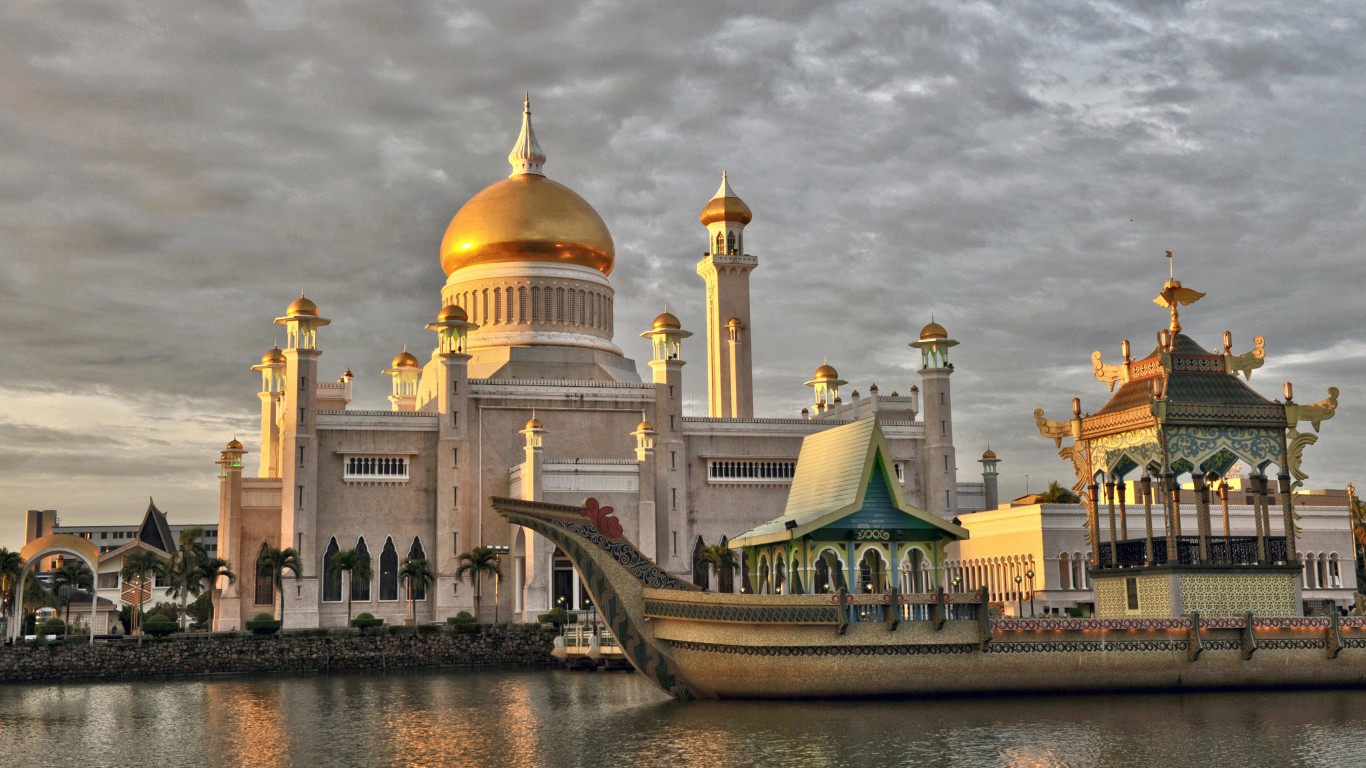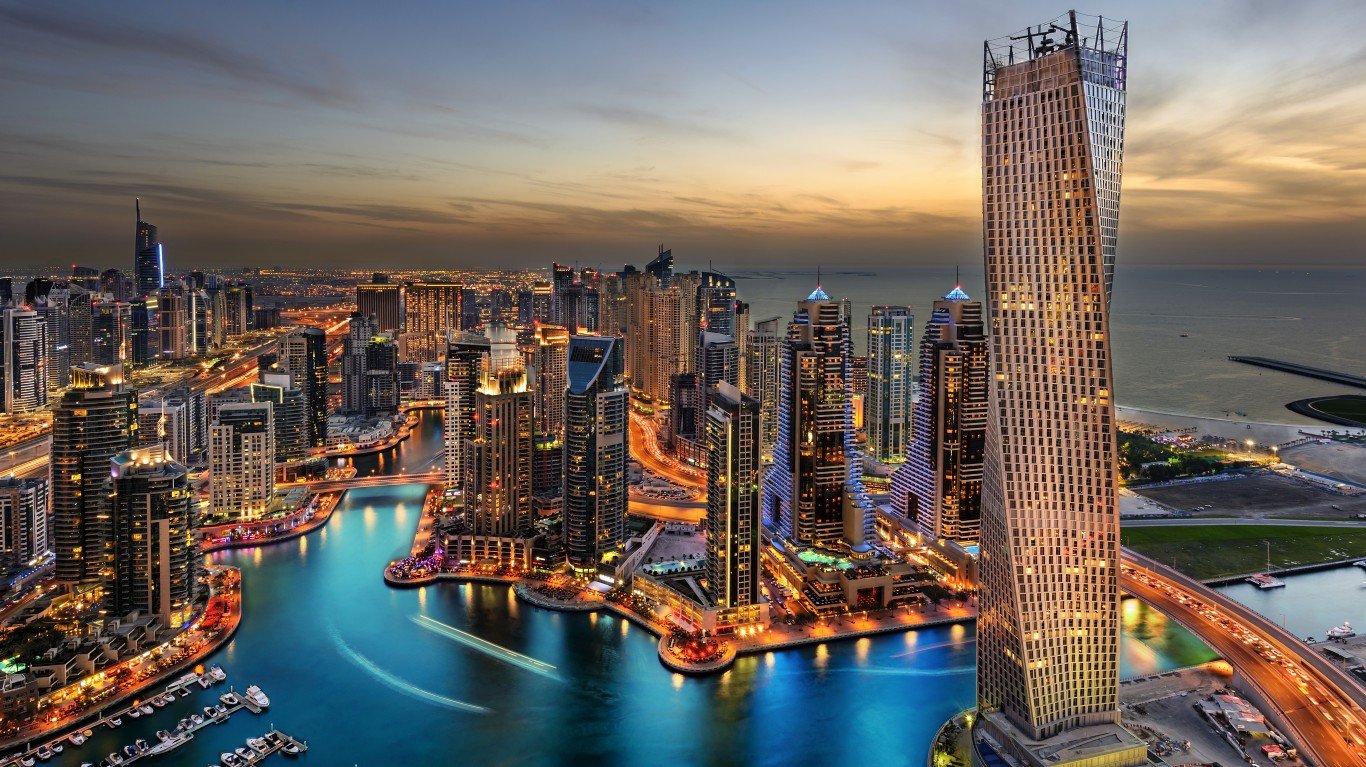
10. United States
> GNI per capita: $66,060
> 2020 GDP: $20.9 trillion
> Population: 329.5 million
> Avg. life expectancy at birth: 78.8 years
The U.S. is the 10th richest country in the world, with a GNI per capita of $66,060. The worldwide GNI per capita is $17,535. The U.S. is by far the largest country to rank among the world’s wealthiest. With nearly 330 million residents, it is actually larger than every other country on this list combined. It also has by far the largest economy on this list, at nearly $21 trillion, which ranks second in the world, trailing only China.
In spite of the size of its economy and relatively high GNI per capita, income inequality is a major issue in the U.S. To measure inequality, the World Bank uses the Gini index, where 0 represents perfectly equal incomes for everyone in the country, and 100 represents all income in a nation going to one person. The U.S.’s score is 41.4, the 29th most unequal of over 100 countries for which there is data. It is also the only one of the 25 richest countries with at least 1% of residents living in extreme poverty, or on $1.90 per day or less.

9. Brunei Darussalam
> GNI per capita: $66,460
> 2020 GDP: $28.7 billion
> Population: 437,483
> Avg. life expectancy at birth: 75.9 years
Brunei Darussalam, or simply Brunei, has the ninth highest gross national income per capita of countries in the world, at $66,460. Unlike most other countries on this list, it is not a democratic country but ruled by a sultan, who is an absolute monarch.
Like several other of the world’s richest countries, a significant share of economic activity in Brunei comes from its relatively large oil industry. Oil rents accounted for 11.6% of the nation’s $28.7 billion GDP, compared to oil rents’ 1.3% share of worldwide economic activity. More than 98% of Brunei’s exports are petroleum.

8. Ireland
> GNI per capita: $69,190
> 2020 GDP: $467.6 billion
> Population: 5.0 million
> Avg. life expectancy at birth: 82.3 years
Ireland ranks eighth on the list of the world’s wealthiest countries. All of Ireland’s businesses and individuals earned a total of $341 billion — both in Ireland and around the world — in 2019, or over $69,000 per person.
A number of foreign companies operate in Ireland due to favorable tax conditions introduced by the nation’s government to attract foreign investment — particularly large global tech companies like Google, Apple, Facebook, and more. This means that Ireland’s GDP is much higher than its GNI as the economic activity takes place in Ireland, but the actual income goes overseas.

7. United Arab Emirates
> GNI per capita: $70,300
> 2019 GDP: $683.5 billion
> Population: 9.9 million
> Avg. life expectancy at birth: 78.0 years
The UAE is a relatively small Middle Eastern country, bordered by Oman, Saudi Arabia, and the Persian Gulf. It is one of seven countries in the world in which local economic activity and income from abroad add up to more than $70,000 per person.
More than 16% of all economic activity in the UAE comes from its oil industry, which is more than 10 times as much as is typical worldwide. The country’s mineral product exports were worth nearly $99 billion in 2019, or just under 40% of the nation’s exports.. UAE also exported billions of dollars worth of precious metals, machinery, cars, medicine, foodstuff, and more that year.

6. Switzerland
> GNI per capita: $73,620
> 2020 GDP: $616.3 billion
> Population: 8.6 million
> Avg. life expectancy at birth: 83.7 years
Switzerland has a GNI per capita of $73,620, higher than all but five other countries in the world. Economic prosperity tends to correlate with improved health outcomes, and Switzerland’s average life expectancy at birth is 11 years higher than the worldwide average life expectancy.
Switzerland has one of the world’s most diverse economies, exporting goods like gold and medicine as well as services in sectors like business, finance, insurance, IT, and more. Economic diversity is correlated with growth, as countries with more diverse economies are able to compete with other countries in a number of sectors.





